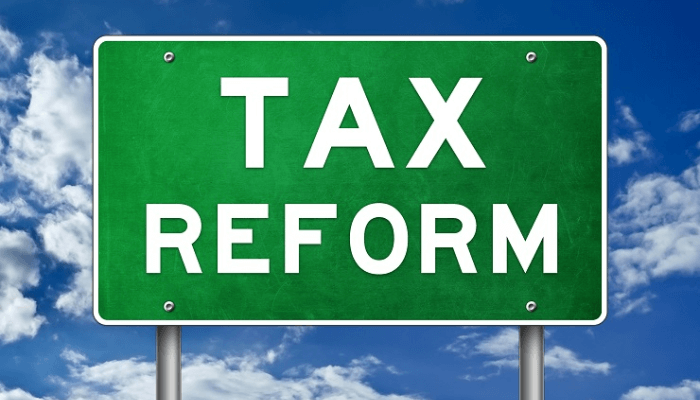Financial matters often captivate public interest, and the recent tax reform bills sent to the National Assembly for consideration and approval by President Bola Tinubu are no exception.
New Telegraph reports that the controversial bills come at a time when government policies, particularly the removal of subsidies on Petroleum Motor Spirit (PMS), otherwise known as petrol or fuel and electricity, have sparked widespread discontent among Nigerians.
The passage of the 2024 Tax Reform Bills 2024 which reflects a mix of hope and skepticism by the National Assembly is a critical step toward establishing a more sustainable fiscal framework.
A critical look into the bill shows it aims to broaden the tax base while tightening enforcement to close loopholes that have long plagued the system.
If passed into law, this reform promises to alter how the government collects and manages taxes, an essential step for enhancing economic stability and social equity.
Tax reform encompasses various strategies, such as reducing tax rates, adjusting the progressivity of the tax system, and simplifying the tax structure. These changes seek to improve clarity and accountability, ultimately benefiting the economy and its citizens.
However, a report from AriseTV’s NewsDay highlighted the uneven distribution of benefits from the tax reforms: while 22 states stand to gain, 14 will suffer, including 10 northern states and four others, including Lagos, Port Harcourt, Bayelsa, and Ebonyi. The latter, particularly Ebonyi, may struggle to absorb the impacts of these changes.
A Framework For Change
The tax reforms which consist of four key components:
Nigerian Tax Bill
Nigerian Tax Administration Bills
Joint Revenue Board Establishment Bill
Nigerian Revenue Service Establishment Bill
Each of these elements plays a crucial role in shaping the future of Nigeria’s tax landscape.
Voices Of Concerns And Hope
Among the voices contributing to this dialogue is a thought leader and accountant, Mrs Olushola Agbalu, who praised the tax reform initiative, highlighting its potential to foster development by exempting income earners below #70,000 Naira from taxation.
According to her, this exemption could empower small-scale businesses, a vital component of Nigeria’s economy.
However, Agbalu also expressed concerns about the disparities in benefits across the country. Drawing parallels with Arabian countries that maintain stable economies without relying on certain revenue streams.
She noted that northern states, which traditionally generate less revenue from sectors like alcohol, may see their allocations diminish. Despite this, she emphasized that reduced tax revenues should not spell disaster for these regions.
Correspondingly, Olaolu Scott BABALOLA, Chief Executive Officer (CEO) of Pitchstone & Smith Ltd said, “It is expedient to note that the Nigeria Tax Bill, Consolidates, previously administered taxation frameworks under separate tax laws, into a single piece of legislation.
“As a result, the Bill proposes to repeal or cancel the Companies Income Tax Act, Personal Income Tax Act, Capital Gains Tax Act, Petroleum Profits Tax Act, Value Added Tax (VAT) Act, and six other tax laws, as well as amend 13 additional tax laws.
“So it is well known that the entire Nigeria Tax Reforms is a coordinated means by which the Federal Govt plans to scrap over 40 redundant taxes and ensure fairness for individuals & businesses.
“For example, the Reform introduces a major shift in Value Added Tax (VAT) calculations, basing it on consumption volume rather than on the company’s production capacity which implies that those earning little with low consumption volume or purchasing power will pay little on taxes, helping them manage their finances better.
Meaning the middle and lower classes in Nigeria will pay little or no taxes. This will help them save for the future, and grow their investment-savings business-wise.
He added that in all, the Tax Reform bills if passed into law by the National Assembly will favour Nigerians by boosting purchasing power, as they pay less for commodities due to tax reliefs, and VAT reductions on goods & services.
Less expenditure on Personal Income. The ability to save more for future capital assets and/or business Creation.’
Speaking on the agitation of the Northern leaders, he noted that “the sharing formula has always been in favour of the North by virtue of population size and number of states: despite the fact that the North contributes less, they enjoy equal sharing formula of 50 -50 per cent.
“And take a bulk share by reason of the number of states’ population in a 30% allocation to the 36 states.
“However, the new allocation for equality will reduce, and allocation for population size % will also reduce, while derivation/revenue derivation gotten from contribution to GDP from individual states will be proportional to what a state gets from the Federal Account.
“So the North will have to buckle up and work harder to increase their states’ GDP contribution.”
Call For Fairness
At the heart of this discussion, a constitutional amendment may serve as a long-term solution, hence, the government must engage with the populace, listen to their concerns and prioritize sincerity and fairness.
The success of this tax reform hinges on whether it is perceived as a genuine transformation rather than a mere alteration of the status quo.
As Nigerians navigate this pivotal moment, it is clear that the public’s perception of tax reforms will play a significant role in their implementation.
However, these reforms can lead to a more equitable and prosperous future for all Nigerians, if the real deal is meant for reformation and not a hidden deformation.















